How to boost collagen naturally with the best ayurvedic collagen boost anti ageing cream
| Estimated Reading Time: 18 minutes |
When it comes to maintaining healthy, youthful-looking skin, collagen is a key player and for keeping your skin firm and smooth, one must incorporate anti ageing cream into daily skincare routine. Collagen is a naturally occurring protein that provides structure, strength, and elasticity to our skin, among other tissues in the body. It acts as a foundation for our skin, keeping it firm, plump, and smooth. In this blog, we will explore what collagen is, what it does to your skin, and what causes the loss of collagen in the skin. We will also delve into natural ways to boost collagen production with the best anti ageing cream, for a glowing complexion.
Highlights: |
What is Collagen?
Collagen is the most abundant protein in our body, making up about 30% of the total protein content. It is found in our skin, bones, muscles, tendons, ligaments, and other connective tissues. Collagen is produced by special cells called fibroblasts, which are found in the dermis, the middle layer of our skin. It is a complex protein made up of amino acids, including glycine, proline, and hydroxyproline, which are essential for its structure and function.

Collagen has a unique triple helix structure, which provides strength and stability to our skin. There are several types of collagen in the body, but type I, type II, and type III collagen are the most abundant types found in the skin. Type I collagen is responsible for the strength and structure of the skin, type II collagen is found in the cartilage, and type III collagen provides elasticity to the skin.
What does collagen do to your skin?
Collagen plays a crucial role in maintaining the health and appearance of our skin. It provides structural support to the dermis, the layer of skin that contains blood vessels, nerve endings, and sweat glands. Collagen fibres form a network that gives the skin its strength and elasticity, keeping it plump, firm, and smooth. Here are some key functions of collagen in the skin:
1. Skin firmness: Collagen fibres act like a scaffold, providing firmness to the skin and preventing sagging and wrinkles.
2. Skin elasticity: Collagen allows the skin to stretch and bounce back to its original shape, maintaining its elasticity and preventing fine lines and wrinkles.
3. Hydration: Collagen helps to retain moisture in the skin, keeping it hydrated and supple.
4. Wound healing: Collagen plays a crucial role in the healing of wounds, as it provides a framework for new skin cells to grow and repair damaged tissue.
5. Protection: Collagen acts as a protective barrier, shielding the skin from harmful environmental factors such as UV radiation, pollution, and toxins.
6. Smooth texture: Collagen contributes to the smooth texture and tone of the skin, giving it a youthful appearance.
What causes loss of collagen in the skin?
As we age, the production of collagen in our skin naturally declines, leading to a decrease in its quantity and quality. Several factors contribute to the loss of collagen in the skin, including:
1. Aging: The natural aging process is one of the primary factors that cause a decline in collagen production. As we age, the fibroblasts in our skin become less active, resulting in a decrease in collagen synthesis.
2. Sun exposure: Prolonged exposure to UV radiation from the sun damages collagen fibres in the skin, leading to premature aging and a decrease in collagen production.
3. Lifestyle factors: Unhealthy lifestyle habits such as smoking, poor nutrition, and excessive alcohol consumption can also accelerate collagen loss in the skin.
4. Environmental factors: Environmental pollutants, toxins, and free radicals can damage collagen fibers in the skin and hinder collagen production.
5. Hormonal changes: Changes in hormonal levels, such as during menopause in women, can also affect collagen production in the skin, leading to a decrease in its quantity and quality.
6. Genetics: Genetics play a role in determining the rate at which collagen naturally declines in the skin. Some individuals may have genetic factors that make them more susceptible to collagen loss and premature aging.
7. Other factors: Other factors such as stress, lack of sleep, and chronic inflammation can also contribute to the loss of collagen in the skin.
The loss of collagen in the skin can result in various signs of aging, including wrinkles, fine lines, sagging skin, and dullness. It can also lead to a decrease in skin elasticity, hydration, and smoothness, making the skin look older and less vibrant.
Collagen benefits for skin
Collagen has numerous benefits for the skin. Here are some of the key advantages of collagen for the skin:
1. Improved skin elasticity: Collagen is responsible for providing elasticity to the skin, making it firm and supple. It helps to maintain the skin's structure and prevents sagging, giving the skin a more youthful appearance.
2. Reduced wrinkles and fine lines: Collagen is a major component of the extracellular matrix of the skin, which provides support and structure. It helps to plump up the skin and smooth out wrinkles and fine lines, making the skin look smoother and more youthful.
3. Enhanced skin hydration: Collagen has the ability to attract and retain moisture, helping to keep the skin hydrated and moisturized. This is crucial for maintaining a healthy skin barrier and preventing dryness and flakiness.
4. Improved skin texture: Collagen helps to improve the overall texture of the skin by promoting cell turnover and stimulating the production of new skin cells. This can result in a smoother, more even complexion.
5. Reduced scarring: Collagen plays a role in the wound healing process and can help to reduce the formation of scars by promoting the growth of healthy skin tissue.
6. Increased sun protection: Collagen has been shown to have a protective effect against UV radiation from the sun, which can cause premature aging of the skin. It helps to neutralize free radicals and reduce oxidative stress on the skin, protecting it from sun damage

How to boost collagen on face?
There are several natural ways to boost collagen in the skin, helping to maintain its youthful appearance. Here are some effective methods:
1. Eat a collagen-rich diet: A healthy diet that is rich in collagen-building nutrients can help to support the production of collagen in the skin. Foods such as bone broth, fish, chicken, eggs, citrus fruits, berries, leafy greens, and nuts are all good sources of collagen-boosting nutrients like vitamin C, proline, and glycine.
2. Use collagen-boosting skincare products: There are skincare products available that are formulated with natural ingredients known to boost collagen production, especially anti ageing creams. Look for ayurvedic skincare products that contain ingredients like ghee, manjistha, sandalwood, bakuchiol, vitamin C, hyaluronic acid, and antioxidants, as these can help to stimulate collagen production and promote skin health. Consider adding anti ageing cream into your skincare routine to boost collagen in your skin.
3. Protect your skin from the sun: UV radiation from the sun can damage collagen fibers in the skin, leading to a decrease in collagen production and premature aging. It is important to protect your skin from the sun by wearing sunscreen with at least SPF 30, seeking shade, wearing protective clothing, and using sunglasses and hats.
4. Quit smoking: Smoking is known to accelerate the aging process and damage collagen in the skin. Quitting smoking can help to boost collagen production and improve the overall health and appearance of the skin.
5. Get regular exercise: Exercise improves blood circulation, which can help to deliver oxygen and nutrients to the skin cells, supporting collagen production. Regular exercise can also help to reduce stress, which can negatively impact collagen production.
6. Get sufficient sleep: Sleep is crucial for overall skin health, including collagen production. During sleep, the body goes through a process of repair and regeneration, including the production of collagen. Make sure to get sufficient, quality sleep on a regular basis to support healthy collagen production and maintain youthful-looking skin.
7. Incorporate facial massage: Facial massage techniques, such as facial rolling or using a Jade Roller, can help to stimulate blood circulation and lymphatic drainage, which can promote collagen production and improve the overall health and appearance of the skin. Use gentle, upward motions when massaging your face to avoid tugging or pulling on the skin.
8. Practice good skincare habits: Taking care of your skin on a daily basis is crucial for maintaining healthy collagen levels. Cleanse your skin regularly with natural, ayurvedic face wash cleanser to remove dirt, oil, and makeup, and use gentle, hydrating ayurvedic skincare products (face tonic, face cream for women and Face serum for glowing skin) that are suitable for your skin type. Avoid harsh skincare products that can strip the skin of its natural oils and disrupt the skin's barrier function.
9. Stay hydrated: Hydration is essential for maintaining healthy skin and promoting collagen production. Make sure to drink plenty of water throughout the day to keep your skin hydrated from within. You can also incorporate hydrating serums for face or moisturizer for face into your skincare routine to provide an additional boost of hydration to the skin.
10. Manage stress: Chronic stress can have a negative impact on collagen production in the skin. Find effective ways to manage stress, such as practicing relaxation techniques, engaging in regular exercise, getting enough sleep, and taking time for self-care. Managing stress can help to support healthy collagen levels in the skin and promote overall skin health.
Herbs for anti-aging and collagen boosting
1. Tulsi (Holy Basil): Tulsi, also known as Holy Basil, is a revered herb in Ayurveda known for its antioxidant and anti-inflammatory properties. It helps to protect the skin from environmental damage, reduces oxidative stress, and promotes collagen production. Tulsi can be consumed as a tea or incorporated into skincare products as an ingredient to reap its collagen-boosting benefits.
2. Gotu Kola: Gotu Kola, also known as Centella Asiatica, is a powerful herb in Ayurveda known for its rejuvenating properties. It helps to stimulate collagen production, boost circulation, and promote wound healing. Gotu Kola can be consumed orally as a supplement or applied topically as a skincare ingredient to promote collagen synthesis.
3. Guduchi (Giloy): Guduchi, also known as Giloy, is a potent herb in Ayurveda known for its immune-boosting properties. It helps to detoxify the body, reduce inflammation, and promote collagen synthesis. Guduchi can be consumed as a supplement or brewed as a tea for its anti-aging benefits.
4. Ashwagandha: Ashwagandha is a popular adaptogenic herb in Ayurveda known for its stress-relieving properties. It helps to reduce oxidative stress, promote cellular regeneration, and boost collagen production. Ashwagandha can be consumed as a supplement or used topically as an ingredient in ayurvedic skincare products for its anti-aging benefits.
5. Amla (Indian Gooseberry): Amla is a vitamin C-rich fruit in Ayurveda known for its antioxidant properties. It helps to neutralize free radicals, promote collagen synthesis, and protect the skin from UV damage. Amla can be consumed orally as a fruit, juice, or supplement, or applied topically as an ingredient in skincare products to boost collagen production.
6. Haldi (Turmeric): Haldi, also known as Turmeric, is a potent spice in Ayurveda known for its anti-inflammatory and antioxidant properties. It helps to reduce inflammation, protect the skin from environmental damage, and promote collagen synthesis. Haldi can be consumed as a spice in cooking or used topically as an ingredient in skincare products for its anti-aging benefits.
7. Ginseng: Ginseng is a popular adaptogenic herb in Ayurveda known for its anti-aging properties. It helps to improve circulation, boost collagen production, and promote cellular regeneration. Ginseng can be consumed as a supplement or used topically as an ingredient in skincare products to enhance collagen synthesis.

Foods that help boost collagen production
In addition to herbs, certain foods can also help the body naturally produce more collagen. Including these foods in your diet can provide the necessary nutrients to support collagen synthesis and promote anti-aging.
1. Bone Broth: Bone broth, made from simmering animal bones, is rich in collagen and provides essential amino acids and minerals that are necessary for collagen synthesis. Consuming bone broth regularly can help promote collagen production and improve skin elasticity and firmness.
2. Fish: Fish, especially cold-water fish like salmon, mackerel, and sardines, are rich sources of omega-3 fatty acids, which are essential for collagen production. Omega-3 fatty acids help reduce inflammation, protect the skin from UV damage, and promote collagen synthesis, making fish an excellent food choice for boosting collagen production naturally.
3. Eggs: Eggs are a great source of protein, which is essential for collagen synthesis. They also contain amino acids like proline and lysine, which are necessary for collagen production. Incorporating eggs into your diet can provide the building blocks needed for collagen synthesis and promote healthy skin.
4. Citrus fruits: Citrus fruits like oranges, lemons, and grapefruits are high in vitamin C, which is a crucial nutrient for collagen production. Vitamin C is an antioxidant that helps to neutralize free radicals, which can damage collagen, and it also plays a role in collagen synthesis. Including citrus fruits in your diet can help promote collagen production and keep your skin looking youthful.
5. Berries: Berries such as strawberries, blueberries, and raspberries are rich in antioxidants, including vitamin C, which helps to protect collagen from oxidative stress. Berries also contain other nutrients like anthocyanins and ellagic acid, which have been shown to promote collagen synthesis and protect against collagen degradation. Adding berries to your diet can provide a tasty and nutritious way to boost collagen production naturally.
6. Leafy Greens: Leafy greens like spinach, kale, and collard greens are packed with vitamins and minerals that are essential for collagen synthesis. They are rich in vitamin C, vitamin A, and antioxidants, which help to protect collagen from damage and promote collagen production. Including leafy greens in your diet can provide the necessary nutrients for collagen synthesis and support overall skin health.
7. Nuts and seeds: Nuts and seeds, such as almonds, walnuts, chia seeds, and flaxseeds, are excellent sources of healthy fats, antioxidants, and amino acids, which are important for collagen production. They also contain minerals like zinc and copper, which play a role in collagen synthesis. Snacking on nuts and seeds or incorporating them into your meals can be a great way to naturally boost collagen production.
8. Avocado: Avocado is a rich source of healthy fats, including monounsaturated fats, which are essential for collagen production. It also contains vitamin E, an antioxidant that helps to protect collagen from damage. Adding avocado to your diet can provide the necessary healthy fats and nutrients to support collagen synthesis.
9. Yogurt: Yogurt is a good source of protein, which is important for collagen synthesis. It also contains probiotics, which help to maintain a healthy gut microbiome. A healthy gut is essential for overall health, including skin health and collagen production. Incorporating yogurt into your diet can provide the necessary protein and probiotics to support collagen synthesis.
10. Green Tea: Green tea is known for its antioxidant properties, thanks to its high content of catechins, which help to protect collagen from damage. Green tea also contains compounds called polyphenols, which have been shown to promote collagen synthesis. Drinking green tea regularly can provide antioxidant benefits and support collagen production naturally.
Best natural anti ageing face cream to boost collagen
Collagen is a protein that plays a crucial role in maintaining the structural integrity and elasticity of our skin. It is responsible for providing support and strength to our skin, giving it a youthful and plump appearance. However, as we age, the production of collagen in our skin decreases, leading to the formation of wrinkles, fine lines, and sagging skin. Many people seek ways to boost collagen production naturally to achieve younger-looking skin without resorting to synthetic collagen. One popular option that has gained popularity in recent years is the use of natural collagen-boosting face creams, and one such product that has garnered rave reviews is the Shubhr Saffron & Sandalwood Anti Ageing Cream for Women by Blue Nectar.
Shubhr Saffron & Sandalwood Anti Ageing Cream for Women is a unique formulation that harnesses the power of natural ingredients to stimulate collagen production and combat the signs of aging. This anti ageing cream is specifically designed for collagen deficit skin and is formulated to address the common skincare concerns faced by mature skin, including wrinkles, fine lines, loss of elasticity, and uneven skin tone.
The key ingredient in the Shubhr Saffron & Sandalwood Anti Ageing Cream for Women is saffron, which is known for its exceptional skincare properties. Saffron has been used in Ayurvedic medicine for centuries for its antioxidant, anti-inflammatory, and anti-aging properties. It is believed to promote collagen production, improve skin texture and tone, and reduce the appearance of wrinkles and fine lines.
Sandalwood is another important ingredient in this anti ageing cream. Sandalwood has been used in ayurvedic skincare products for centuries due to its antimicrobial, anti-inflammatory, and skin-soothing properties. It is known to help soothe irritated skin, reduce inflammation, and promote a youthful complexion. Sandalwood also helps in tightening the skin and improving its elasticity, making it a valuable ingredient in an anti ageing cream.
Apart from saffron and sandalwood, the Shubhr Saffron & Sandalwood Anti Ageing Cream for Women also contains other natural ingredients that work synergistically to boost collagen production and provide comprehensive skincare benefits. These include almond oil, apricot oil, kokum butter, and Shea butter. Almond oil is rich in antioxidants, healthy fats, and vitamins E and A, which help nourish and moisturize the skin, improve skin elasticity, and promote collagen production. Apricot oil is rich in essential fatty acids and antioxidants that help moisturize and nourish the skin, improve its texture, and enhance its elasticity. Kokum butter and Shea butter are known for their moisturizing properties and help in keeping the skin hydrated, soft, and supple. All these ingredients make this the best anti ageing cream for boosting collagen topically.
One of the unique features of the Shubhr Saffron & Sandalwood Anti Ageing Cream for Women is its light and non-greasy texture. The anti ageing cream is easily absorbed by the skin without leaving a greasy residue, making it suitable for all skin types, including oily and combination skin.This anti ageing cream can be used both as a day cream and a night cream, and a small amount goes a long way in providing intense hydration and nourishment to the skin.
Regular use of the Shubhr Saffron & Sandalwood Anti Ageing Cream for Women is believed to provide several benefits to the skin. Firstly, it helps in stimulating collagen production, which can help in improving skin elasticity, reducing the appearance of wrinkles and fine lines, and giving the skin a youthful and plump appearance. Secondly, the anti ageing cream by Blue Nectar helps in moisturizing and nourishing the skin, keeping it hydrated, soft, and supple. This can help in improving skin texture and tone, and reducing dryness and flakiness. Thirdly, the anti-inflammatory properties of saffron and sandalwood can help in reducing skin inflammation and redness, making this anti ageing cream ideal for those with sensitive or irritated skin. Shubhr anti ageing cream also works to improve uneven skin tone, promoting a more youthful and radiant complexion.
Another notable feature of the Shubhr Saffron & Sandalwood Anti Ageing Cream for Women is that it is free from harmful chemicals such as parabens, sulfates, and artificial fragrances, making it a safer option for those who prefer natural skincare products. The sandalwood cream is also cruelty-free, meaning it is not tested on animals, making it a conscious choice for those who prioritize ethical skincare.
In addition to its anti-aging properties, the Shubhr Saffron & Sandalwood Anti Ageing Cream for Women also provides a luxurious and sensory experience. The cream has a pleasant, natural fragrance derived from saffron and sandalwood, which can provide a relaxing and soothing effect on the mind and senses. The anti ageing cream also comes in an elegant and sturdy packaging, making it a visually appealing addition to any skincare routine.
To use the Shubhr Saffron & Sandalwood Anti Ageing Cream for Women, simply cleanse your face thoroughly and apply a small amount of the anti ageing cream onto your face and neck using gentle upward strokes. Massage the cream in circular motions until it is fully absorbed. For best results, use the face cream twice daily, in the morning and evening, as part of your skincare routine.
It is worth mentioning that while the Shubhr Saffron & Sandalwood Anti Ageing Cream for Women is a natural collagen-boosting cream that can provide significant benefits for mature skin, it is important to understand that individual results may vary. Skincare products can react differently on different skin types, and factors such as genetics, lifestyle, and overall skincare routine can also impact the effectiveness of the cream. It is always recommended to perform a patch test before applying the cream to your face to ensure that you do not have any adverse reactions.

In conclusion, the Shubhr Saffron & Sandalwood Anti Ageing Cream for Women by Blue Nectar is a natural collagen-boosting face cream that offers numerous benefits for mature skin. With its unique blend of natural ingredients, including saffron, sandalwood, almond oil, apricot oil, kokum butter, and Shea butter, this anti ageing cream is designed to stimulate collagen production, improve skin elasticity, moisturize and nourish the skin, and promote a youthful complexion. Its light and non-greasy texture, pleasant fragrance, and cruelty-free formulation make it a popular choice among those looking for a natural and effective anti-aging cream.
However, as with any skincare product, it is important to perform a patch test and consult with a dermatologist if you have any specific skin concerns or conditions. Incorporating the Shubhr Saffron & Sandalwood anti ageing cream for women into their skincare routine can be a step towards achieving naturally youthful and radiant skin.
Recommended Products by Blue Nectar:
Shubhr Saffron & Sandalwood Anti ageing Cream for Women | Skin Firming & Radiance
Kumkumadi Face Oil for Glowing Skin & Firming (26 Herbs, 10ml)
Shubhr Rose Face Tonic Mist | Skin Toning & pH Balance
Shubhr Sandalwood Skin Brightening Cream for Women | Even Skin Tone and Radiance


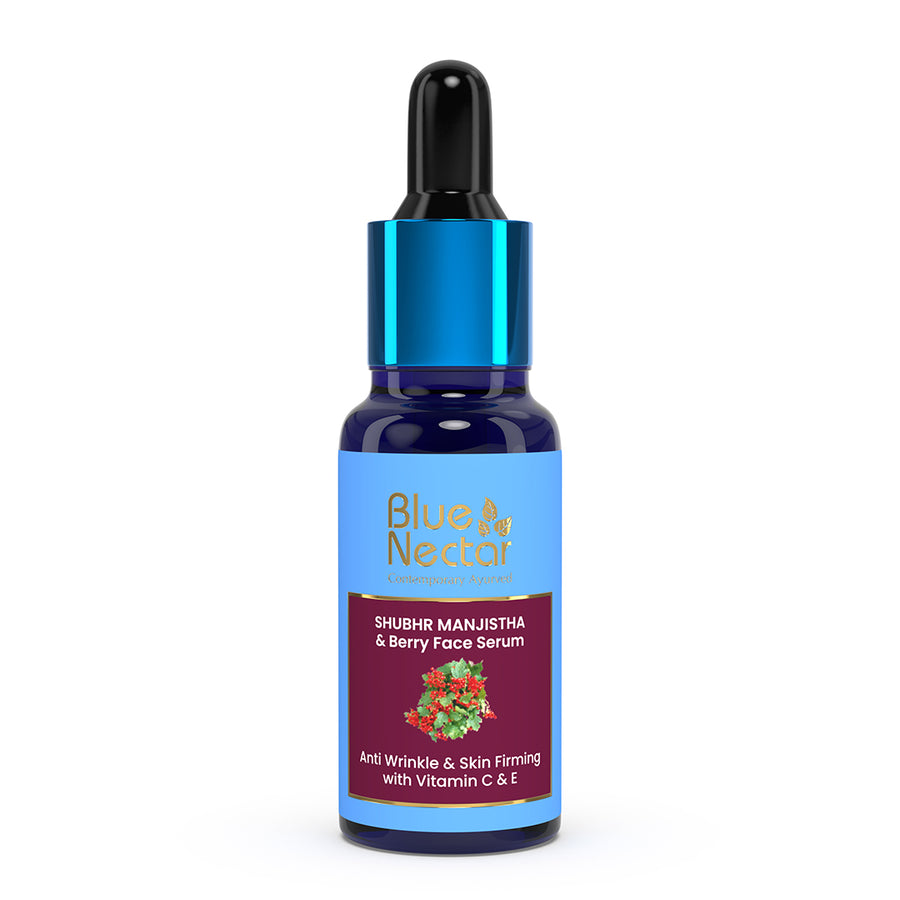

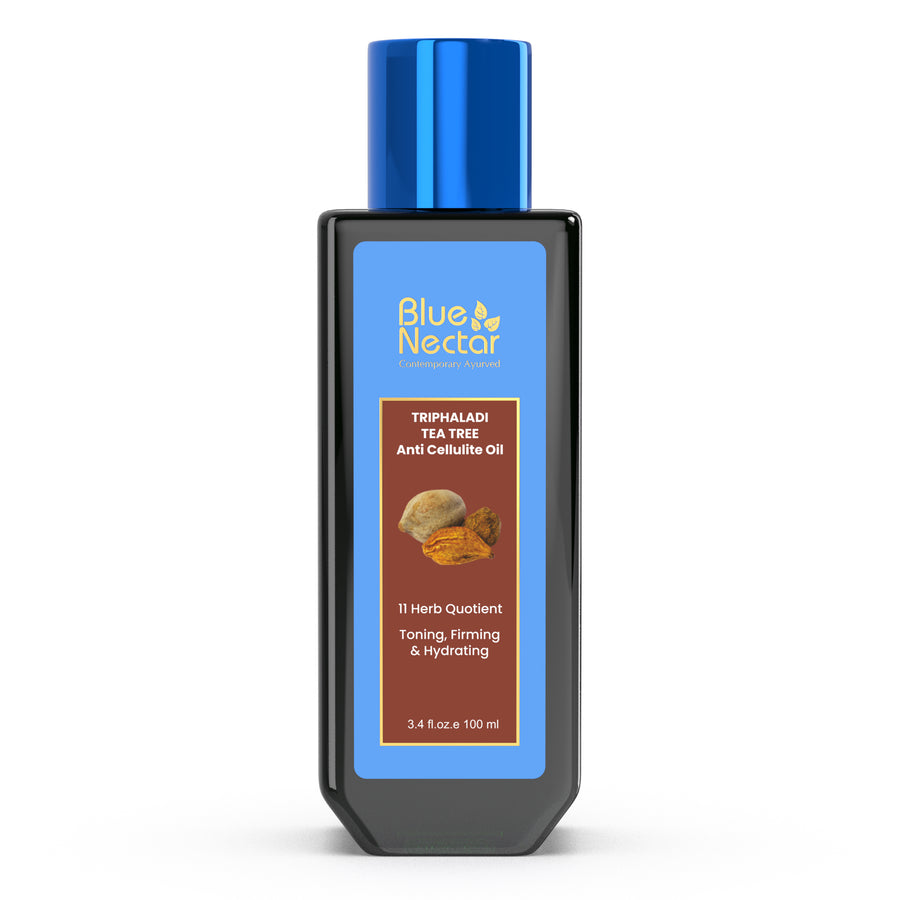

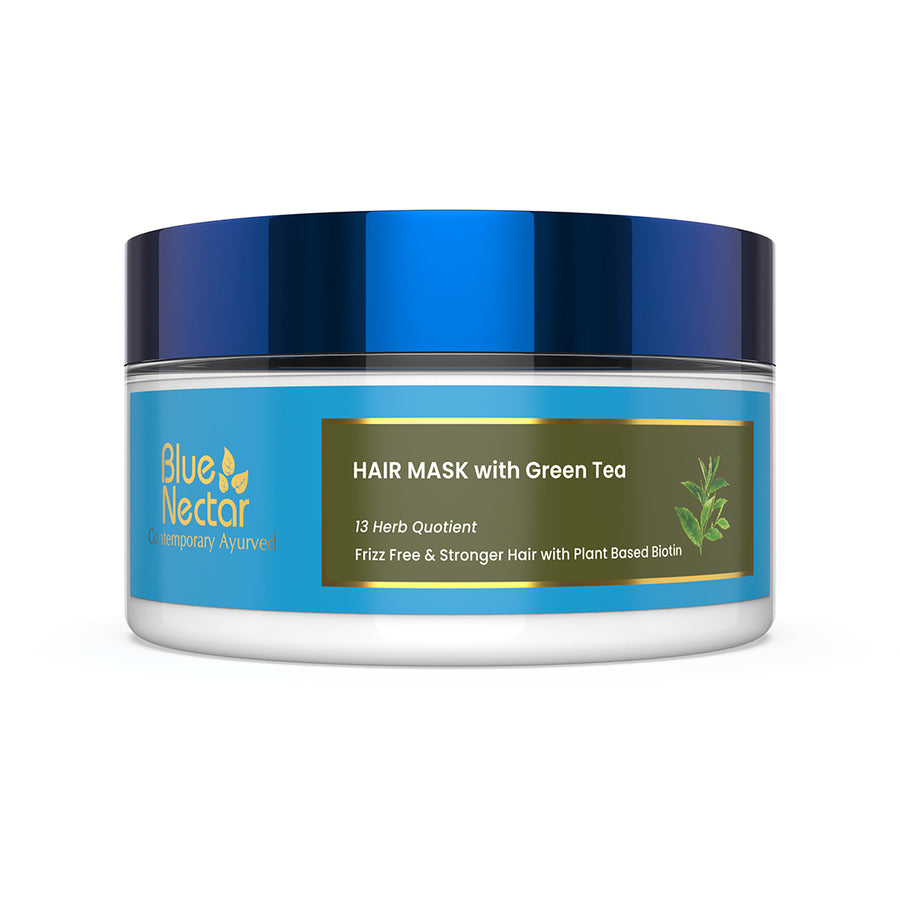
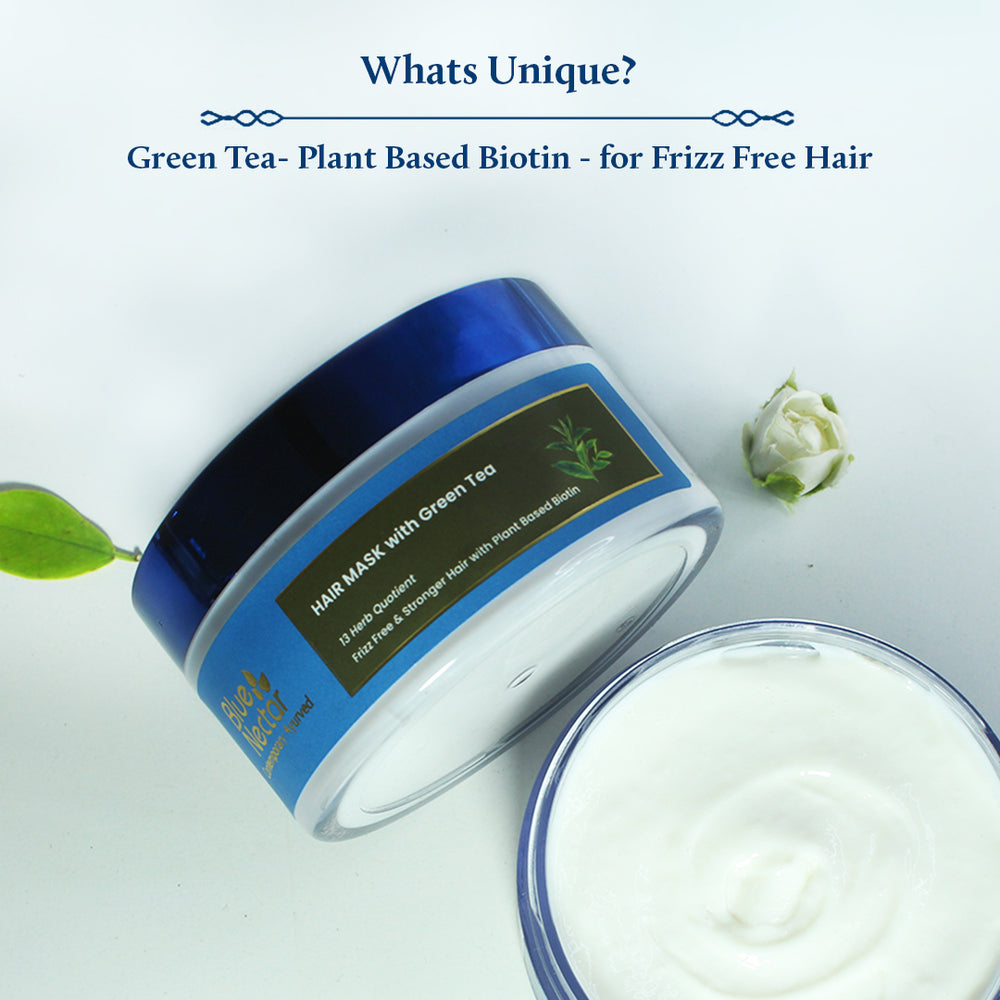


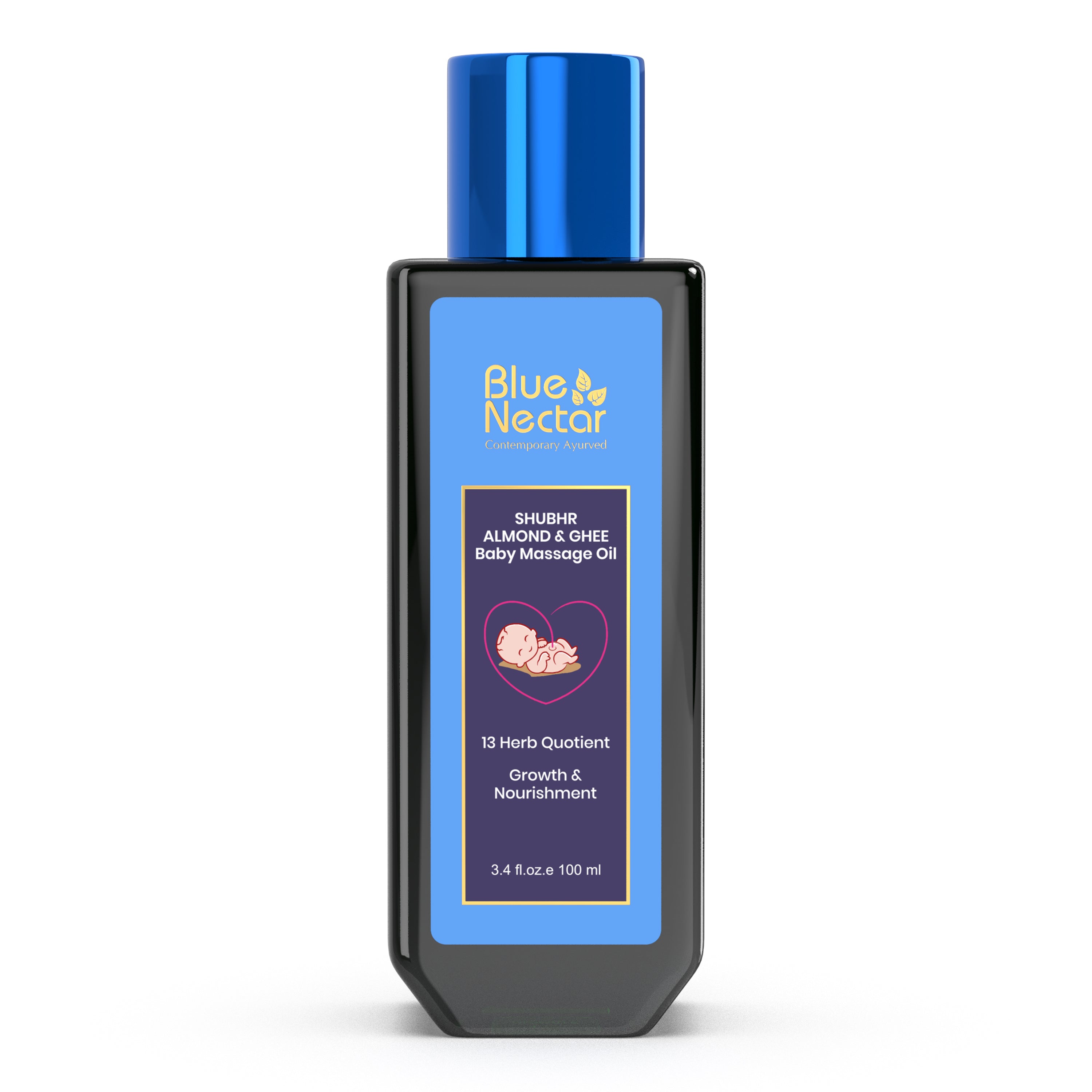

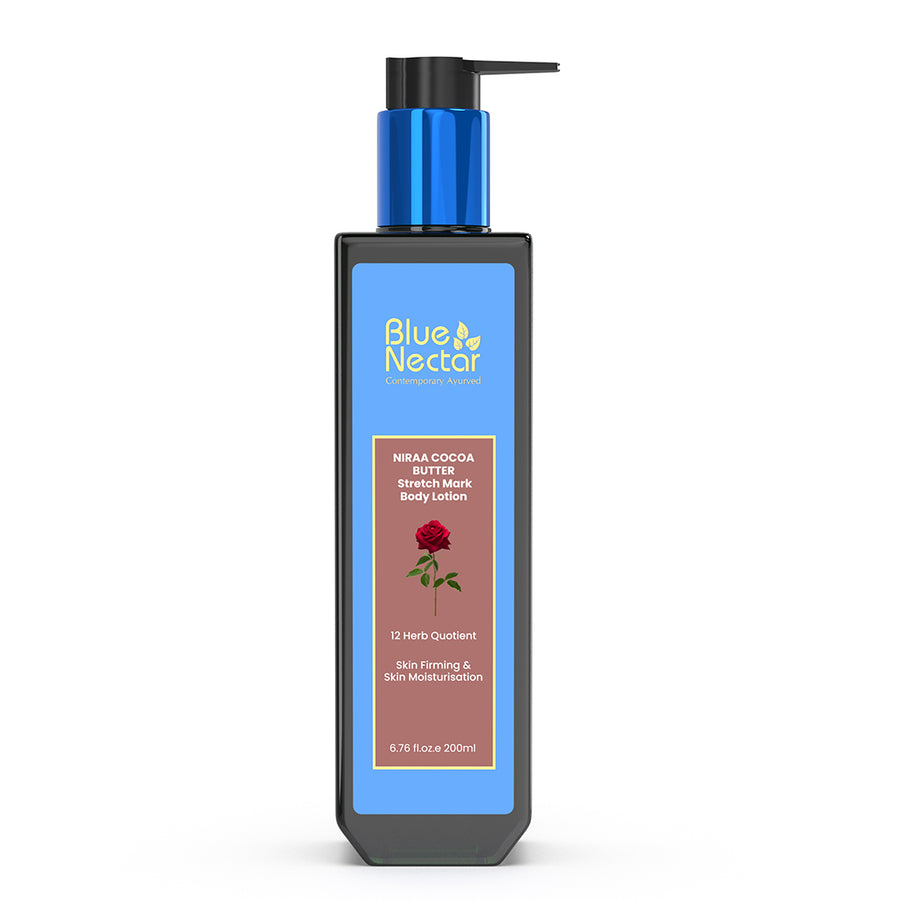

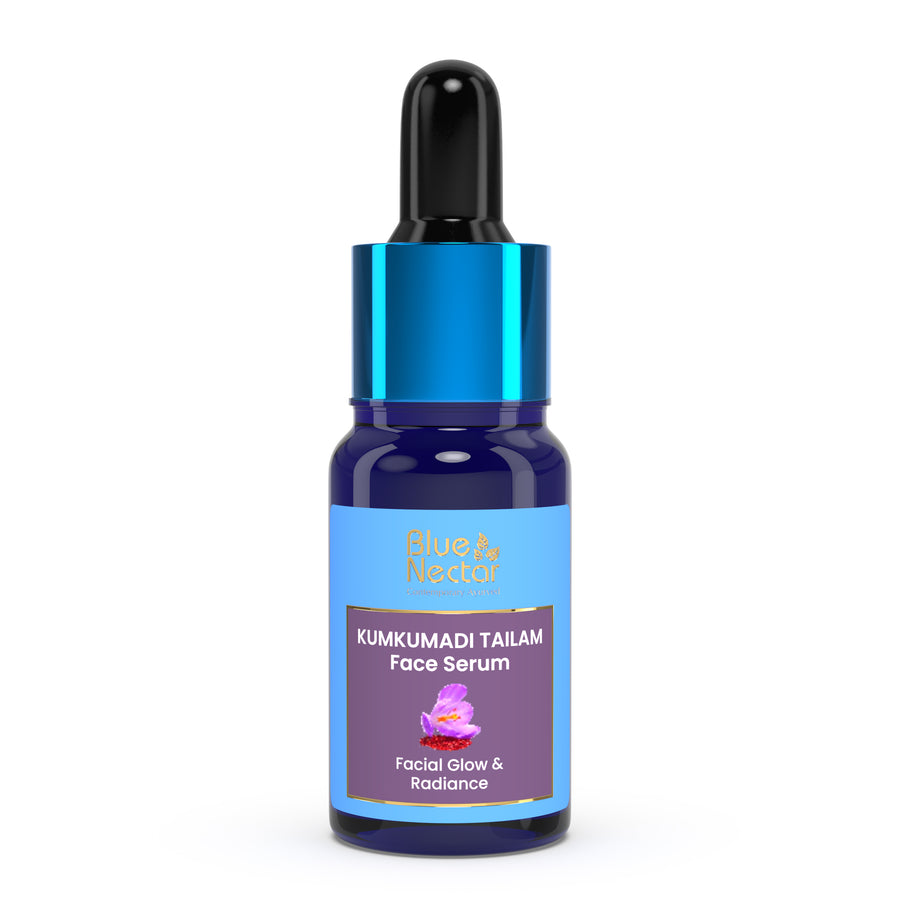


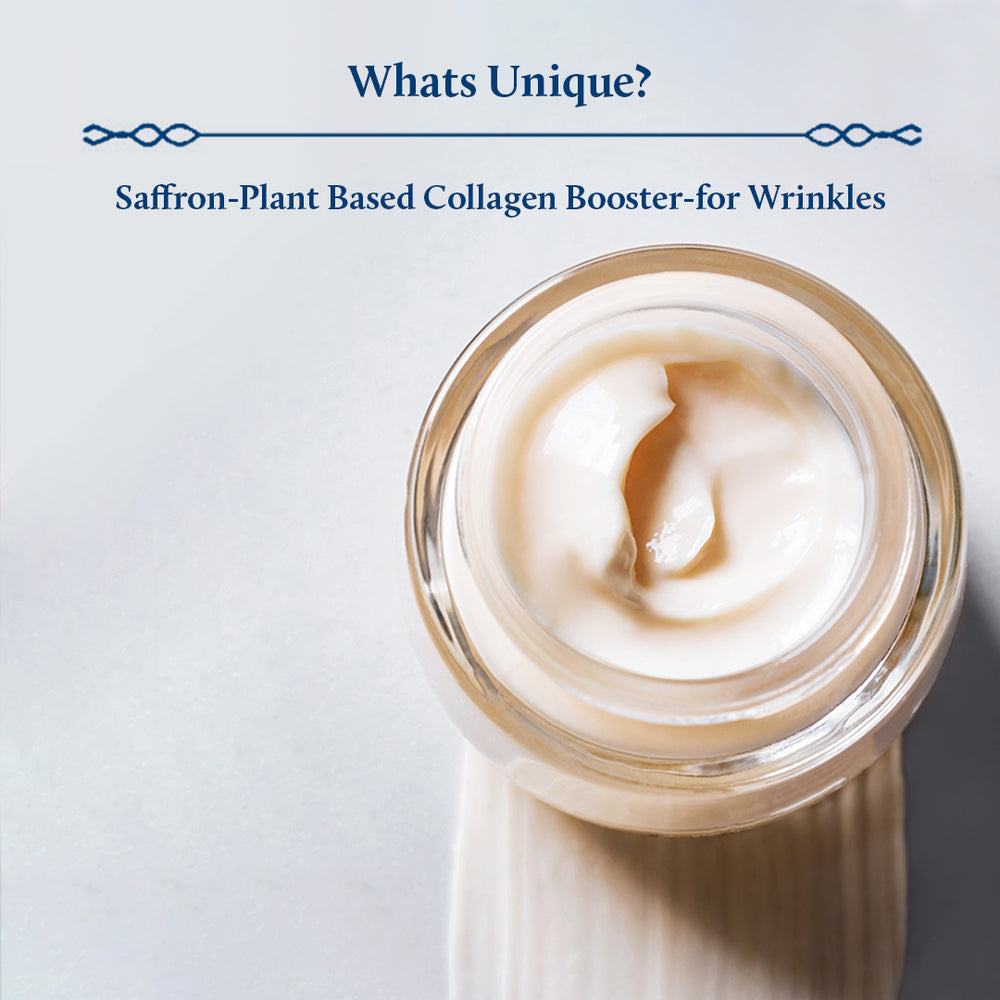
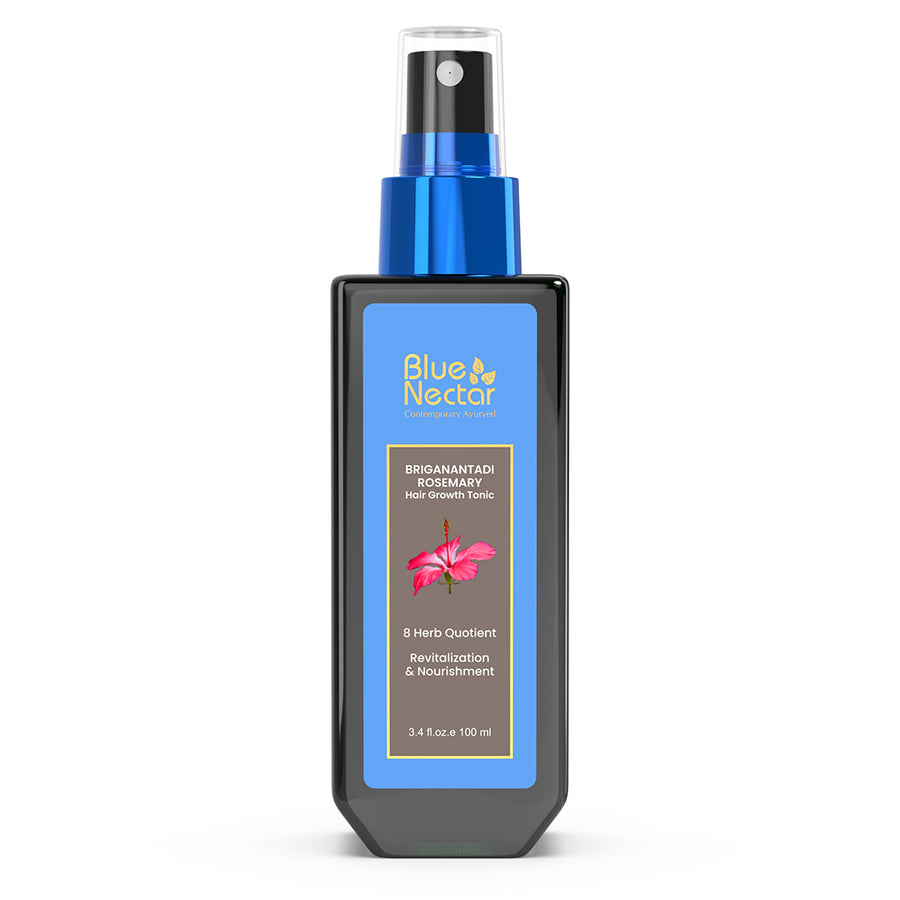

Leave a comment